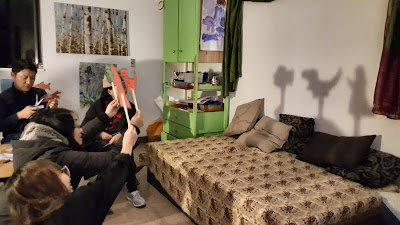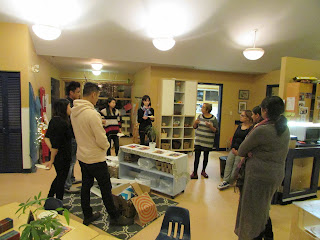When we made the decision to invite parents into our curriculum as real partners in exploring the children's thinking, we were afraid. Afraid parents wouldn't show up, or that they would show up wouldn't understand what we were sharing , or wouldn't participate as we hoped. This anxiety had kept us from diving into curriculum meetings for too long so we jumped in.
And what an amazing journey it has been and how much richer the SRCC is for this meeting up together to share thinking and perspectives in service of the children. Parents have wholeheartedly showed up and offered their perspectives and ideas and been so touched to have this insight into their children's thinking and exploration. Educators have gained so much joy and confidence from sharing their work that is so often not visible. They feel seen and energized and ready to take the investigation and curiosity of the children to a new level.
Our ritual usually includes the children leaving something for the families to discover in the program and then, in turn, the families leave something for the children to discover the next morning when they return. The children understand this exchange of gifts and revel in the giving and the receiving of them and it is a joy to see their knowing that this place and their work in it matter to their families.
I used these quotes at our recent AGM from our friend Ann Pelo's new book "From Teaching to Thinking"
“ A
community that learns is in continual construction of collective understandings
born of multiple perspectives coming together.
This isn’t easy! The give-and-take of authentic exchange does not mean
happy-dappy, easy-as-pie congeniality.
Authentic relationships ask that we offer ourselves to each other; that
we consider difficult and complex circumstances together; that we argue, we
make mistakes, we disagree. We join
together as comrades and collaborators, yes, and also with people quite
different from ourselves, people who challenge and vex us”
“Dialogue is
not simply ‘talking to each other’ – swapping points of view and leaving you to
‘make up your mind’. It involves being
prepared to wrestle with another’s perspective.
Dialogue is a collaborative act.”
Take a
moment to consider this excerpt with a few lenses – as a child in our program,
as an Educator, as a leader, as a parent… share your thoughts with the person
or people around you for a minute or two.
“ This sort
of dialogue is at the heart of a community that learns. It is a courageous act in a brave space in a
culture of inquiry that prizes questions more than answers, values complexity,
and uncertainty, honours insight and imagination, and is committed to the
shared construction of knowledge and understanding. Genuine collaboration requires brave space,
and a community that learns requires genuine collaboration.”
I hope you will see from the 3 reports from 3 different Curriculum meetings how the SRCC is living in to being a community the learns. Bravo to all the Educators and parents investing in that.
Cook Road Children's Centre
Last night our Parent Curriculum meeting was held at Cook Road Children's Centre.. Sharing with the parents their children's and our journey to discover the science of shadow and reflection was a humbling experience. We struggled to support the children's learning but their enthusiasm was so energizing and compelled us to continue this investigation. Admitting to the parents that we do not always have an answer started the dialogue and brought us closer together. The children's fascination of the shadow puppet show prompted us to ask the parents to make a puppet for their own child. During this activity we noticed that some parents struggled and needed help. It just showed that we all are humans and we need each other. Especially working with children, we value each family's input , this work can not be done without you.
Thank you!
Cranberry Children's Centre IT Program
"Our I/T parents had the opportunity to explore the deeper meaning of their children's interest in cars and transportation toys during our parent meeting night. After exploring our classroom, we discussed questions involving what we placed our identity in in our childhood whether it be a place, colour, talent/skill as well as discuss their children's favourite places they love to visit and probably travelled there by car. This may evoke such excitement and joy in the children to travel to a variety of places through different forms of transportation. As the children investigate their love of cars and their identity in this complex world, we encouraged the parents to give back an offering of themselves to their children by making a collage to be placed on the floor of all the favourite places their families love to visit. It was wonderful to collaborate with the parents regarding their ideas of what their children are learning about and we are excited to see how the children respond to the collage their parents created for them!"
Gardens 3-5 Program
On Wednesday, November 28th, Gardens 3-5 program Educators welcomed parents to participate in our first curriculum meeting. We had a wonderful opportunity to come together as a community to have dialogue about our children’s investigation of spiders. Parents shared their own experiences with spiders and then the educators offered them provocations that had inspired their children over the course of a few months. Parents were creating webs, drawings, and used playdough to represent their own thoughts. We all felt that it was a great way to start our relationship with the families as partners in our curriculum, as well as our own confidence and skills to have these meetings
I am so proud of our learning community!!!
Nicky
















































